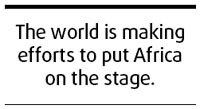Courting Africa
(China Daily)
Updated: 2008-04-10 07:28
Updated: 2008-04-10 07:28
Africa is a jewel in the jungle. It has been attracting much attention from the rest of the world.
It has turned out to be a partner that every country or region is eager to cooperate with.
The inaugural India-Africa Forum Summit in New Delhi in the past two days offered a fresh insight into the modern-day interest in Africa. At the gathering India was attempting to establish a "strategic partnership" with Africa.

The European Union and African countries put their heads together for a second time late last year in what organizers hoped to lay the new foundations of a partnership of mutual respect between the former colonial powers and Africa.
The continent will continue to be a hot topic next month when Japan will host the fourth International Conference on Africa Development. One of the main agenda items will be how to accelerate and ensure sustainable growth through infrastructure development, investment and trade.
The Japanese government is considering doubling official development assistance for Africa in five years. Japan's policy has long centered on extending untied overseas development aid loans to first build infrastructure in developing countries and then lure private investment.
The efforts that the rest of the world has been taking to put Africa on the stage should be good news for the continent.
What are the real issues for Africa when the rest of the world is "strategically" interested in the continent?
At the summit in New Delhi, African leaders hoped that their cooperation with India would help solve their development-related issues.
Africa is the most marginalized continent in terms of its global finance and trade. It has the key goals of eradicating absolute poverty, ensuring healthcare for all, quality education for children, achieving a harmonious balance between population growth and food production, ensuring durable peace, sustainable development by addressing the root causes of conflict, promoting regional cooperation and integration, and sharpening its international competitiveness.
The price hikes worldwide will impose pain on the long-suffering Africans. It is imperative for the world to help the continent survive the rising grain prices.
Rising food prices are driving up inflation in Africa - since African households spend a relatively high proportion of their earnings on food, higher prices are expected to hit incomes hard. The situation is posing fresh challenges for the region.
The tide of price hikes knows no borders but makes the underdeveloped countries more miserable.
While the rest of the world reaches out to Africa, this basic issue should come first.
(China Daily 04/10/2008 page8)
|
|
|
|